Business Law Report: Unit 7, BTEC HNC, Business Operations
VerifiedAdded on 2023/01/09
|12
|3966
|60
Report
AI Summary
This report delves into the realm of business law, examining various facets crucial for business operations. It begins by outlining the sources of law, including domestic legislation, EU law, and common law, while also defining key legal terminologies such as court structure and appellate jurisdiction. The report then differentiates between civil and criminal laws, highlighting the roles of government bodies in lawmaking and the organization of the judiciary. Furthermore, it explores the impact of legislative laws, such as employment, competition, and data protection laws, on business practices. The report also covers the legal formation of different types of organizations, including incorporated and unincorporated businesses, and their respective legal structures. It analyzes the roles of employers and employees and the importance of health and safety regulations. Finally, the report addresses the legal solutions available for resolving a range of business disputes, including contract law and other relevant legal frameworks.
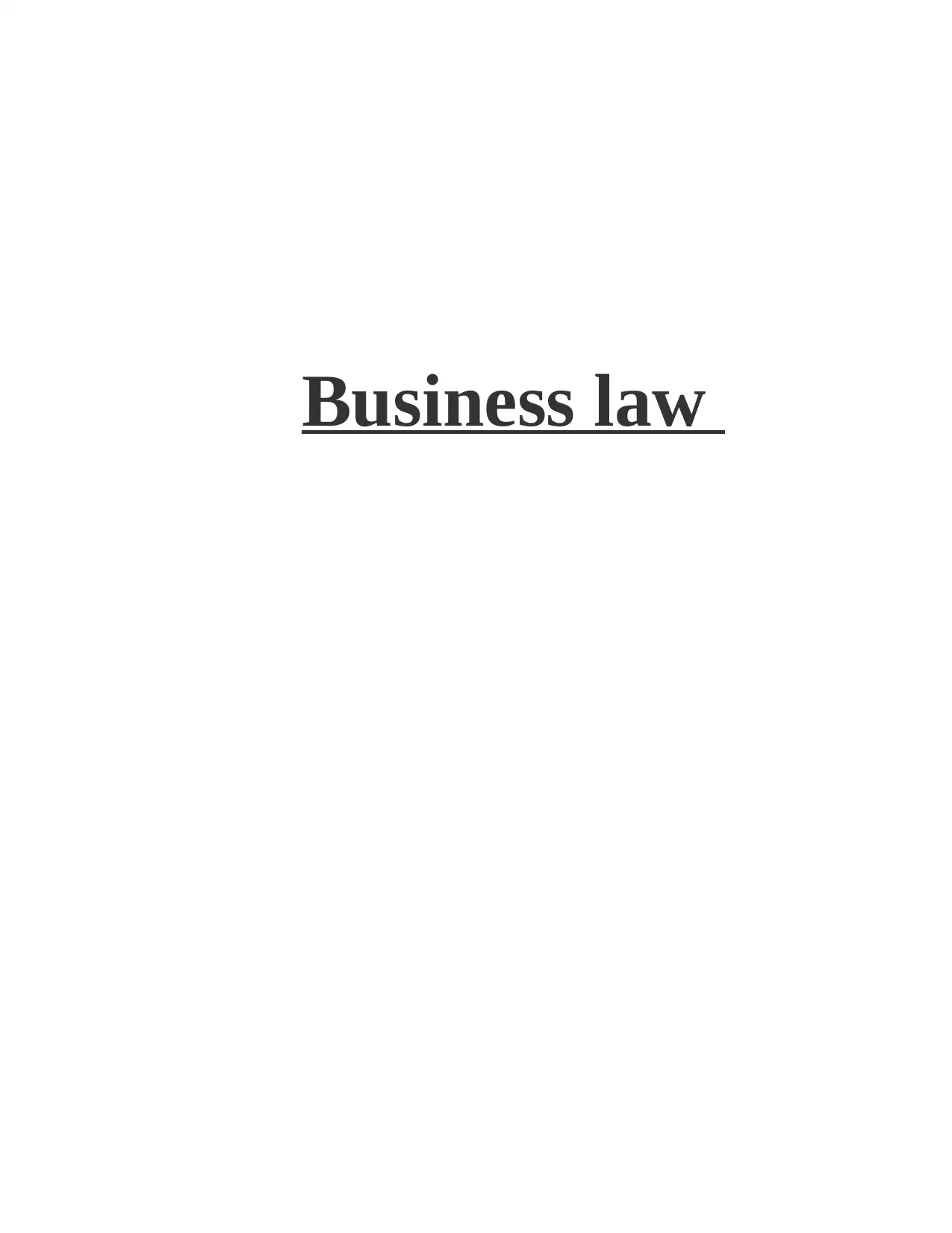
Business law
Paraphrase This Document
Need a fresh take? Get an instant paraphrase of this document with our AI Paraphraser
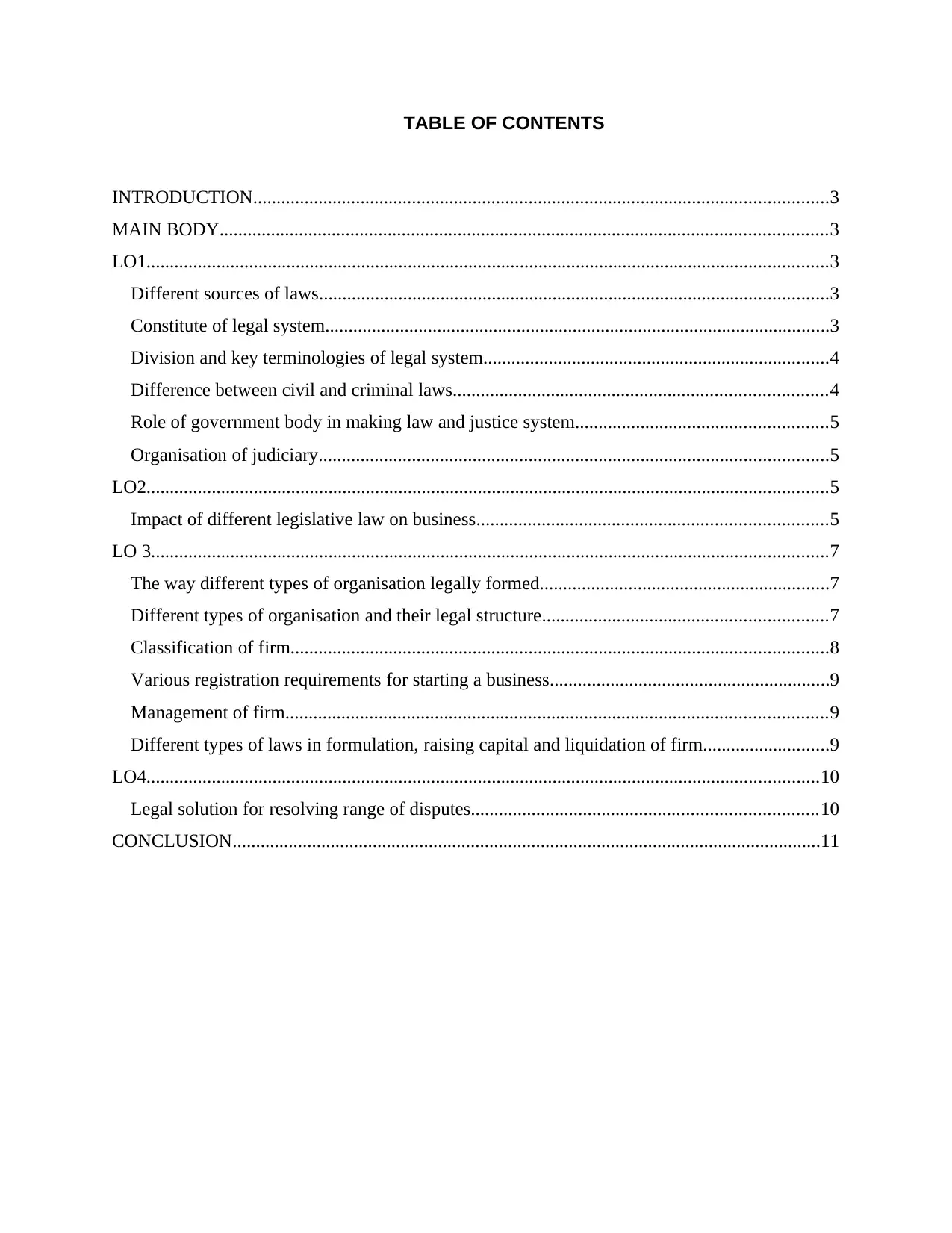
TABLE OF CONTENTS
INTRODUCTION...........................................................................................................................3
MAIN BODY..................................................................................................................................3
LO1..................................................................................................................................................3
Different sources of laws.............................................................................................................3
Constitute of legal system............................................................................................................3
Division and key terminologies of legal system..........................................................................4
Difference between civil and criminal laws................................................................................4
Role of government body in making law and justice system......................................................5
Organisation of judiciary.............................................................................................................5
LO2..................................................................................................................................................5
Impact of different legislative law on business...........................................................................5
LO 3.................................................................................................................................................7
The way different types of organisation legally formed..............................................................7
Different types of organisation and their legal structure.............................................................7
Classification of firm...................................................................................................................8
Various registration requirements for starting a business............................................................9
Management of firm....................................................................................................................9
Different types of laws in formulation, raising capital and liquidation of firm...........................9
LO4................................................................................................................................................10
Legal solution for resolving range of disputes..........................................................................10
CONCLUSION..............................................................................................................................11
INTRODUCTION...........................................................................................................................3
MAIN BODY..................................................................................................................................3
LO1..................................................................................................................................................3
Different sources of laws.............................................................................................................3
Constitute of legal system............................................................................................................3
Division and key terminologies of legal system..........................................................................4
Difference between civil and criminal laws................................................................................4
Role of government body in making law and justice system......................................................5
Organisation of judiciary.............................................................................................................5
LO2..................................................................................................................................................5
Impact of different legislative law on business...........................................................................5
LO 3.................................................................................................................................................7
The way different types of organisation legally formed..............................................................7
Different types of organisation and their legal structure.............................................................7
Classification of firm...................................................................................................................8
Various registration requirements for starting a business............................................................9
Management of firm....................................................................................................................9
Different types of laws in formulation, raising capital and liquidation of firm...........................9
LO4................................................................................................................................................10
Legal solution for resolving range of disputes..........................................................................10
CONCLUSION..............................................................................................................................11
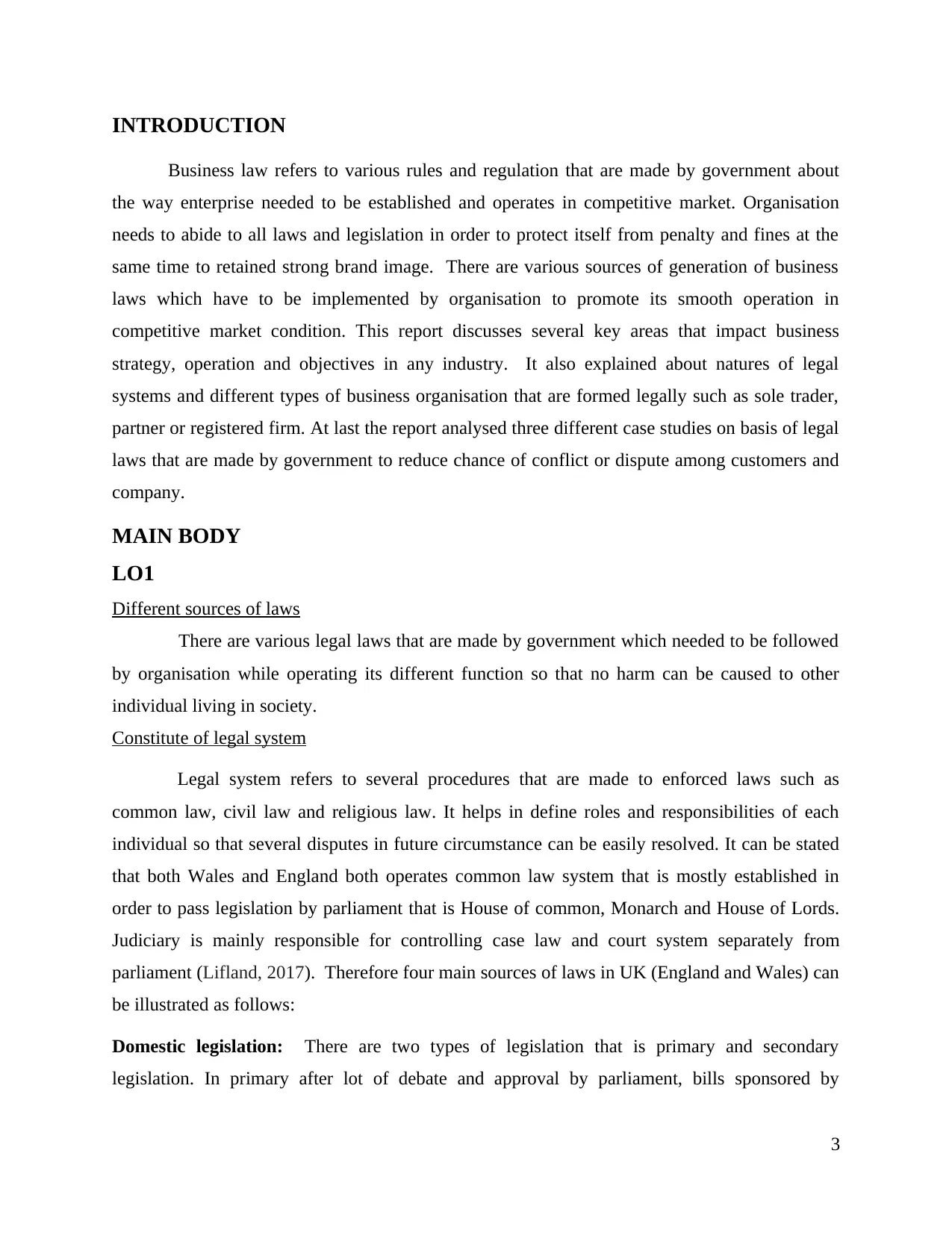
INTRODUCTION
Business law refers to various rules and regulation that are made by government about
the way enterprise needed to be established and operates in competitive market. Organisation
needs to abide to all laws and legislation in order to protect itself from penalty and fines at the
same time to retained strong brand image. There are various sources of generation of business
laws which have to be implemented by organisation to promote its smooth operation in
competitive market condition. This report discusses several key areas that impact business
strategy, operation and objectives in any industry. It also explained about natures of legal
systems and different types of business organisation that are formed legally such as sole trader,
partner or registered firm. At last the report analysed three different case studies on basis of legal
laws that are made by government to reduce chance of conflict or dispute among customers and
company.
MAIN BODY
LO1
Different sources of laws
There are various legal laws that are made by government which needed to be followed
by organisation while operating its different function so that no harm can be caused to other
individual living in society.
Constitute of legal system
Legal system refers to several procedures that are made to enforced laws such as
common law, civil law and religious law. It helps in define roles and responsibilities of each
individual so that several disputes in future circumstance can be easily resolved. It can be stated
that both Wales and England both operates common law system that is mostly established in
order to pass legislation by parliament that is House of common, Monarch and House of Lords.
Judiciary is mainly responsible for controlling case law and court system separately from
parliament (Lifland, 2017). Therefore four main sources of laws in UK (England and Wales) can
be illustrated as follows:
Domestic legislation: There are two types of legislation that is primary and secondary
legislation. In primary after lot of debate and approval by parliament, bills sponsored by
3
Business law refers to various rules and regulation that are made by government about
the way enterprise needed to be established and operates in competitive market. Organisation
needs to abide to all laws and legislation in order to protect itself from penalty and fines at the
same time to retained strong brand image. There are various sources of generation of business
laws which have to be implemented by organisation to promote its smooth operation in
competitive market condition. This report discusses several key areas that impact business
strategy, operation and objectives in any industry. It also explained about natures of legal
systems and different types of business organisation that are formed legally such as sole trader,
partner or registered firm. At last the report analysed three different case studies on basis of legal
laws that are made by government to reduce chance of conflict or dispute among customers and
company.
MAIN BODY
LO1
Different sources of laws
There are various legal laws that are made by government which needed to be followed
by organisation while operating its different function so that no harm can be caused to other
individual living in society.
Constitute of legal system
Legal system refers to several procedures that are made to enforced laws such as
common law, civil law and religious law. It helps in define roles and responsibilities of each
individual so that several disputes in future circumstance can be easily resolved. It can be stated
that both Wales and England both operates common law system that is mostly established in
order to pass legislation by parliament that is House of common, Monarch and House of Lords.
Judiciary is mainly responsible for controlling case law and court system separately from
parliament (Lifland, 2017). Therefore four main sources of laws in UK (England and Wales) can
be illustrated as follows:
Domestic legislation: There are two types of legislation that is primary and secondary
legislation. In primary after lot of debate and approval by parliament, bills sponsored by
3
⊘ This is a preview!⊘
Do you want full access?
Subscribe today to unlock all pages.

Trusted by 1+ million students worldwide
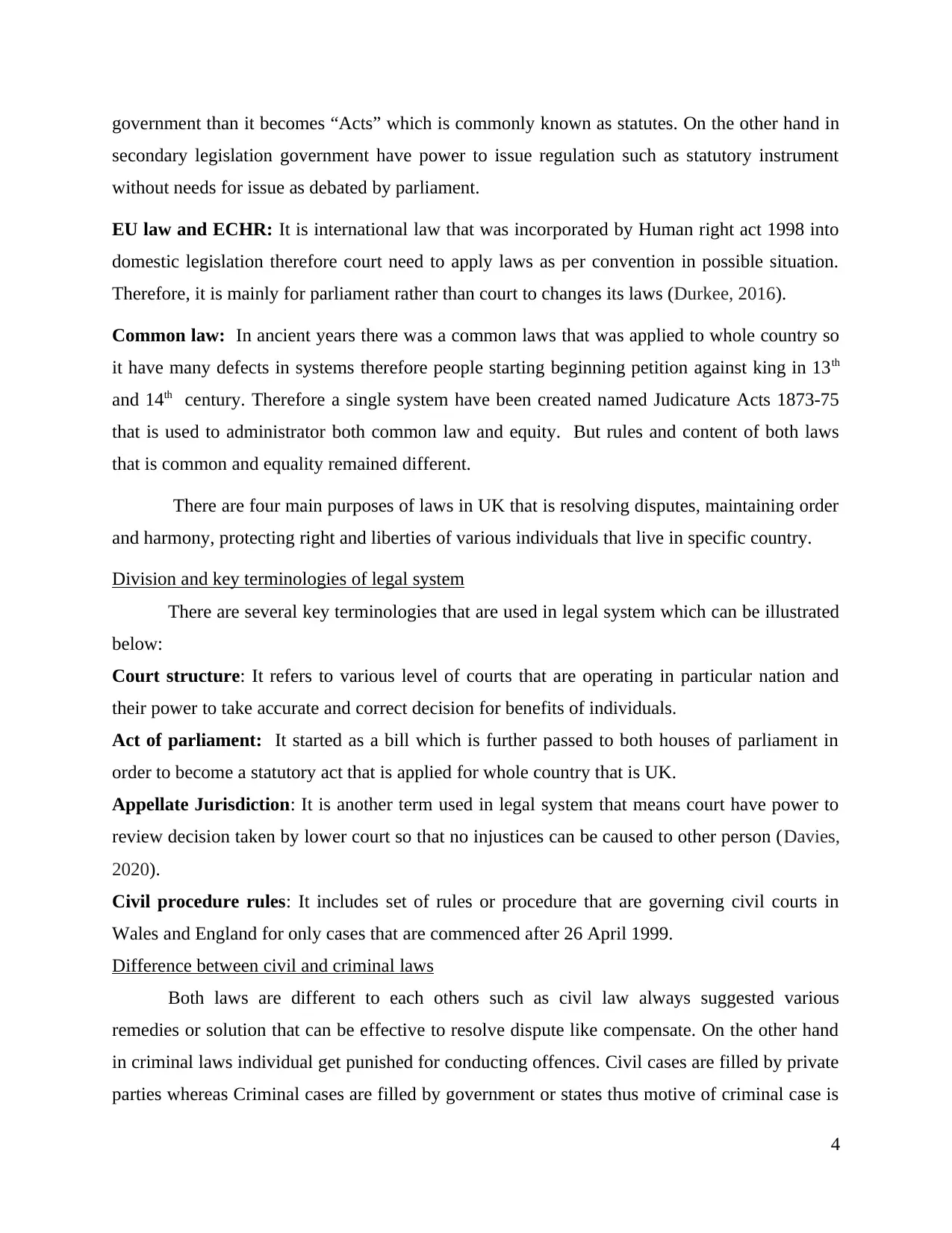
government than it becomes “Acts” which is commonly known as statutes. On the other hand in
secondary legislation government have power to issue regulation such as statutory instrument
without needs for issue as debated by parliament.
EU law and ECHR: It is international law that was incorporated by Human right act 1998 into
domestic legislation therefore court need to apply laws as per convention in possible situation.
Therefore, it is mainly for parliament rather than court to changes its laws (Durkee, 2016).
Common law: In ancient years there was a common laws that was applied to whole country so
it have many defects in systems therefore people starting beginning petition against king in 13th
and 14th century. Therefore a single system have been created named Judicature Acts 1873-75
that is used to administrator both common law and equity. But rules and content of both laws
that is common and equality remained different.
There are four main purposes of laws in UK that is resolving disputes, maintaining order
and harmony, protecting right and liberties of various individuals that live in specific country.
Division and key terminologies of legal system
There are several key terminologies that are used in legal system which can be illustrated
below:
Court structure: It refers to various level of courts that are operating in particular nation and
their power to take accurate and correct decision for benefits of individuals.
Act of parliament: It started as a bill which is further passed to both houses of parliament in
order to become a statutory act that is applied for whole country that is UK.
Appellate Jurisdiction: It is another term used in legal system that means court have power to
review decision taken by lower court so that no injustices can be caused to other person (Davies,
2020).
Civil procedure rules: It includes set of rules or procedure that are governing civil courts in
Wales and England for only cases that are commenced after 26 April 1999.
Difference between civil and criminal laws
Both laws are different to each others such as civil law always suggested various
remedies or solution that can be effective to resolve dispute like compensate. On the other hand
in criminal laws individual get punished for conducting offences. Civil cases are filled by private
parties whereas Criminal cases are filled by government or states thus motive of criminal case is
4
secondary legislation government have power to issue regulation such as statutory instrument
without needs for issue as debated by parliament.
EU law and ECHR: It is international law that was incorporated by Human right act 1998 into
domestic legislation therefore court need to apply laws as per convention in possible situation.
Therefore, it is mainly for parliament rather than court to changes its laws (Durkee, 2016).
Common law: In ancient years there was a common laws that was applied to whole country so
it have many defects in systems therefore people starting beginning petition against king in 13th
and 14th century. Therefore a single system have been created named Judicature Acts 1873-75
that is used to administrator both common law and equity. But rules and content of both laws
that is common and equality remained different.
There are four main purposes of laws in UK that is resolving disputes, maintaining order
and harmony, protecting right and liberties of various individuals that live in specific country.
Division and key terminologies of legal system
There are several key terminologies that are used in legal system which can be illustrated
below:
Court structure: It refers to various level of courts that are operating in particular nation and
their power to take accurate and correct decision for benefits of individuals.
Act of parliament: It started as a bill which is further passed to both houses of parliament in
order to become a statutory act that is applied for whole country that is UK.
Appellate Jurisdiction: It is another term used in legal system that means court have power to
review decision taken by lower court so that no injustices can be caused to other person (Davies,
2020).
Civil procedure rules: It includes set of rules or procedure that are governing civil courts in
Wales and England for only cases that are commenced after 26 April 1999.
Difference between civil and criminal laws
Both laws are different to each others such as civil law always suggested various
remedies or solution that can be effective to resolve dispute like compensate. On the other hand
in criminal laws individual get punished for conducting offences. Civil cases are filled by private
parties whereas Criminal cases are filled by government or states thus motive of criminal case is
4
Paraphrase This Document
Need a fresh take? Get an instant paraphrase of this document with our AI Paraphraser
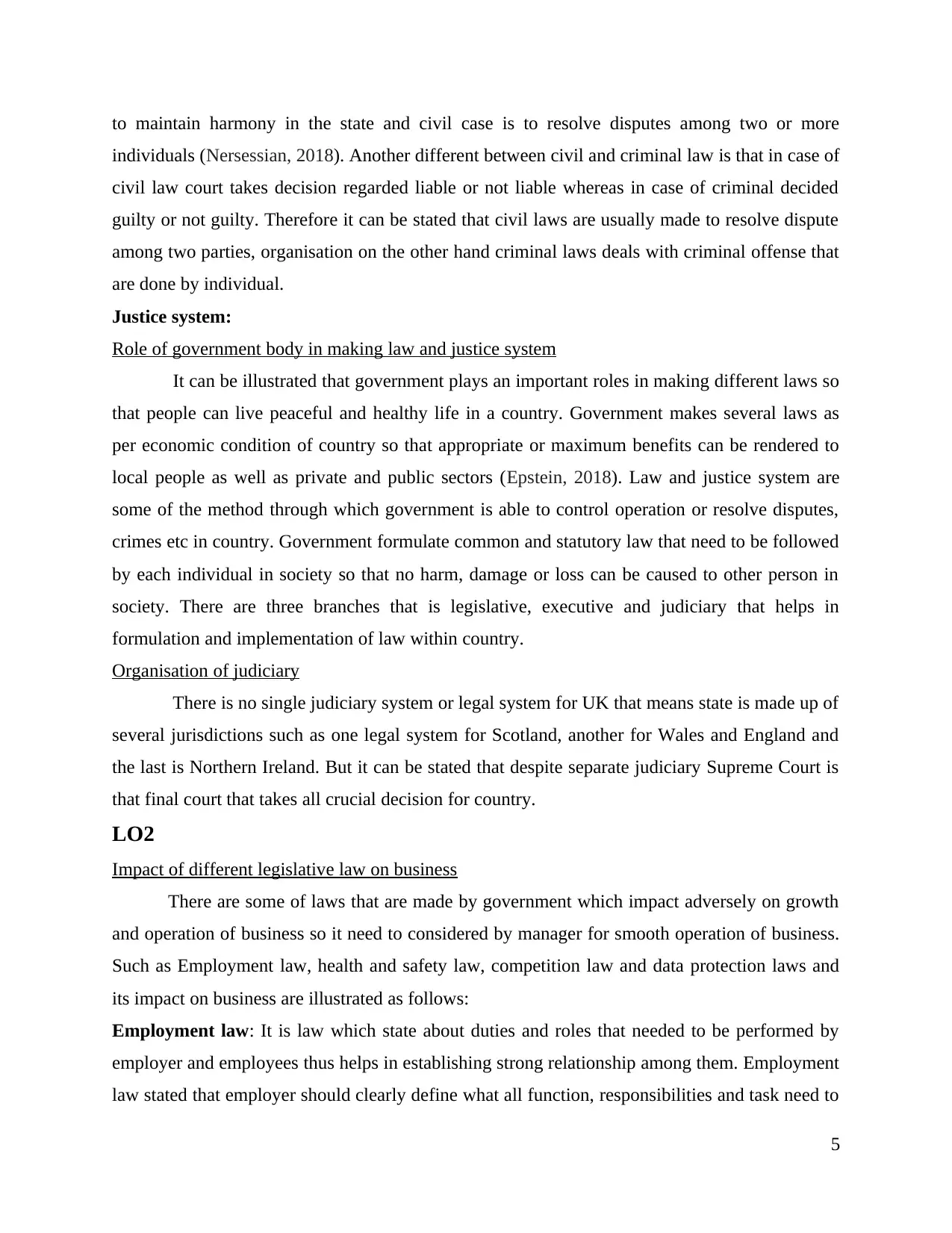
to maintain harmony in the state and civil case is to resolve disputes among two or more
individuals (Nersessian, 2018). Another different between civil and criminal law is that in case of
civil law court takes decision regarded liable or not liable whereas in case of criminal decided
guilty or not guilty. Therefore it can be stated that civil laws are usually made to resolve dispute
among two parties, organisation on the other hand criminal laws deals with criminal offense that
are done by individual.
Justice system:
Role of government body in making law and justice system
It can be illustrated that government plays an important roles in making different laws so
that people can live peaceful and healthy life in a country. Government makes several laws as
per economic condition of country so that appropriate or maximum benefits can be rendered to
local people as well as private and public sectors (Epstein, 2018). Law and justice system are
some of the method through which government is able to control operation or resolve disputes,
crimes etc in country. Government formulate common and statutory law that need to be followed
by each individual in society so that no harm, damage or loss can be caused to other person in
society. There are three branches that is legislative, executive and judiciary that helps in
formulation and implementation of law within country.
Organisation of judiciary
There is no single judiciary system or legal system for UK that means state is made up of
several jurisdictions such as one legal system for Scotland, another for Wales and England and
the last is Northern Ireland. But it can be stated that despite separate judiciary Supreme Court is
that final court that takes all crucial decision for country.
LO2
Impact of different legislative law on business
There are some of laws that are made by government which impact adversely on growth
and operation of business so it need to considered by manager for smooth operation of business.
Such as Employment law, health and safety law, competition law and data protection laws and
its impact on business are illustrated as follows:
Employment law: It is law which state about duties and roles that needed to be performed by
employer and employees thus helps in establishing strong relationship among them. Employment
law stated that employer should clearly define what all function, responsibilities and task need to
5
individuals (Nersessian, 2018). Another different between civil and criminal law is that in case of
civil law court takes decision regarded liable or not liable whereas in case of criminal decided
guilty or not guilty. Therefore it can be stated that civil laws are usually made to resolve dispute
among two parties, organisation on the other hand criminal laws deals with criminal offense that
are done by individual.
Justice system:
Role of government body in making law and justice system
It can be illustrated that government plays an important roles in making different laws so
that people can live peaceful and healthy life in a country. Government makes several laws as
per economic condition of country so that appropriate or maximum benefits can be rendered to
local people as well as private and public sectors (Epstein, 2018). Law and justice system are
some of the method through which government is able to control operation or resolve disputes,
crimes etc in country. Government formulate common and statutory law that need to be followed
by each individual in society so that no harm, damage or loss can be caused to other person in
society. There are three branches that is legislative, executive and judiciary that helps in
formulation and implementation of law within country.
Organisation of judiciary
There is no single judiciary system or legal system for UK that means state is made up of
several jurisdictions such as one legal system for Scotland, another for Wales and England and
the last is Northern Ireland. But it can be stated that despite separate judiciary Supreme Court is
that final court that takes all crucial decision for country.
LO2
Impact of different legislative law on business
There are some of laws that are made by government which impact adversely on growth
and operation of business so it need to considered by manager for smooth operation of business.
Such as Employment law, health and safety law, competition law and data protection laws and
its impact on business are illustrated as follows:
Employment law: It is law which state about duties and roles that needed to be performed by
employer and employees thus helps in establishing strong relationship among them. Employment
law stated that employer should clearly define what all function, responsibilities and task need to
5
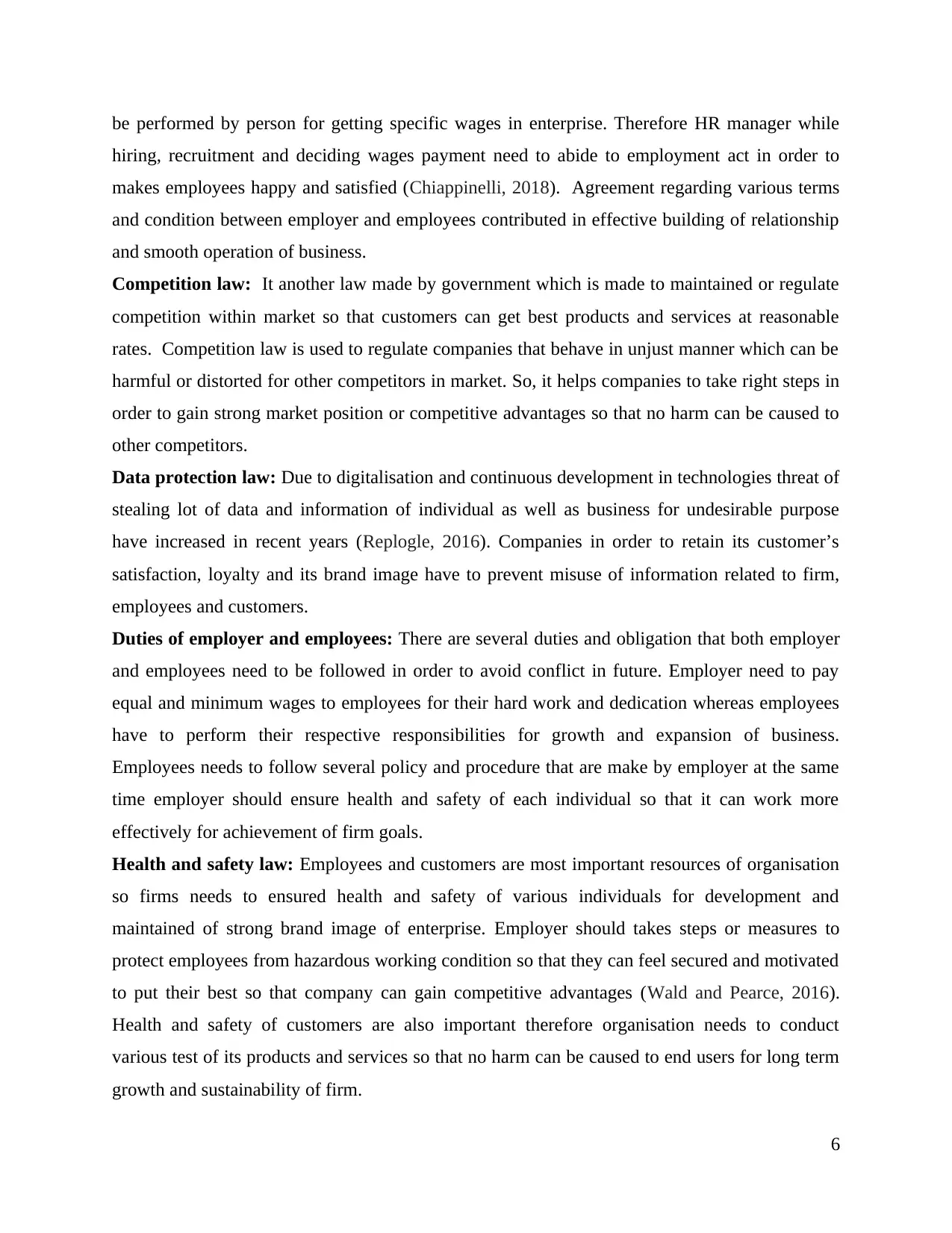
be performed by person for getting specific wages in enterprise. Therefore HR manager while
hiring, recruitment and deciding wages payment need to abide to employment act in order to
makes employees happy and satisfied (Chiappinelli, 2018). Agreement regarding various terms
and condition between employer and employees contributed in effective building of relationship
and smooth operation of business.
Competition law: It another law made by government which is made to maintained or regulate
competition within market so that customers can get best products and services at reasonable
rates. Competition law is used to regulate companies that behave in unjust manner which can be
harmful or distorted for other competitors in market. So, it helps companies to take right steps in
order to gain strong market position or competitive advantages so that no harm can be caused to
other competitors.
Data protection law: Due to digitalisation and continuous development in technologies threat of
stealing lot of data and information of individual as well as business for undesirable purpose
have increased in recent years (Replogle, 2016). Companies in order to retain its customer’s
satisfaction, loyalty and its brand image have to prevent misuse of information related to firm,
employees and customers.
Duties of employer and employees: There are several duties and obligation that both employer
and employees need to be followed in order to avoid conflict in future. Employer need to pay
equal and minimum wages to employees for their hard work and dedication whereas employees
have to perform their respective responsibilities for growth and expansion of business.
Employees needs to follow several policy and procedure that are make by employer at the same
time employer should ensure health and safety of each individual so that it can work more
effectively for achievement of firm goals.
Health and safety law: Employees and customers are most important resources of organisation
so firms needs to ensured health and safety of various individuals for development and
maintained of strong brand image of enterprise. Employer should takes steps or measures to
protect employees from hazardous working condition so that they can feel secured and motivated
to put their best so that company can gain competitive advantages (Wald and Pearce, 2016).
Health and safety of customers are also important therefore organisation needs to conduct
various test of its products and services so that no harm can be caused to end users for long term
growth and sustainability of firm.
6
hiring, recruitment and deciding wages payment need to abide to employment act in order to
makes employees happy and satisfied (Chiappinelli, 2018). Agreement regarding various terms
and condition between employer and employees contributed in effective building of relationship
and smooth operation of business.
Competition law: It another law made by government which is made to maintained or regulate
competition within market so that customers can get best products and services at reasonable
rates. Competition law is used to regulate companies that behave in unjust manner which can be
harmful or distorted for other competitors in market. So, it helps companies to take right steps in
order to gain strong market position or competitive advantages so that no harm can be caused to
other competitors.
Data protection law: Due to digitalisation and continuous development in technologies threat of
stealing lot of data and information of individual as well as business for undesirable purpose
have increased in recent years (Replogle, 2016). Companies in order to retain its customer’s
satisfaction, loyalty and its brand image have to prevent misuse of information related to firm,
employees and customers.
Duties of employer and employees: There are several duties and obligation that both employer
and employees need to be followed in order to avoid conflict in future. Employer need to pay
equal and minimum wages to employees for their hard work and dedication whereas employees
have to perform their respective responsibilities for growth and expansion of business.
Employees needs to follow several policy and procedure that are make by employer at the same
time employer should ensure health and safety of each individual so that it can work more
effectively for achievement of firm goals.
Health and safety law: Employees and customers are most important resources of organisation
so firms needs to ensured health and safety of various individuals for development and
maintained of strong brand image of enterprise. Employer should takes steps or measures to
protect employees from hazardous working condition so that they can feel secured and motivated
to put their best so that company can gain competitive advantages (Wald and Pearce, 2016).
Health and safety of customers are also important therefore organisation needs to conduct
various test of its products and services so that no harm can be caused to end users for long term
growth and sustainability of firm.
6
⊘ This is a preview!⊘
Do you want full access?
Subscribe today to unlock all pages.

Trusted by 1+ million students worldwide
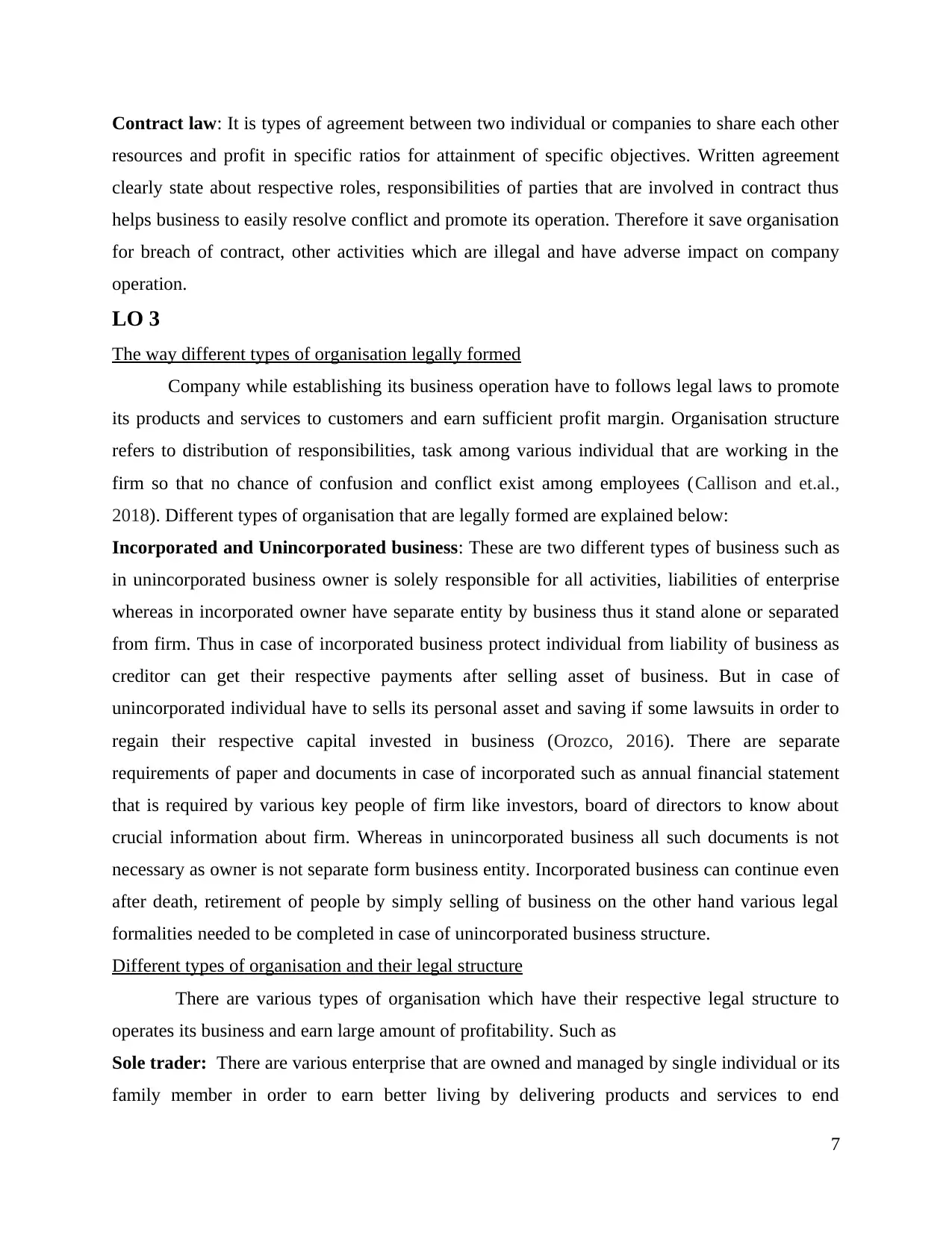
Contract law: It is types of agreement between two individual or companies to share each other
resources and profit in specific ratios for attainment of specific objectives. Written agreement
clearly state about respective roles, responsibilities of parties that are involved in contract thus
helps business to easily resolve conflict and promote its operation. Therefore it save organisation
for breach of contract, other activities which are illegal and have adverse impact on company
operation.
LO 3
The way different types of organisation legally formed
Company while establishing its business operation have to follows legal laws to promote
its products and services to customers and earn sufficient profit margin. Organisation structure
refers to distribution of responsibilities, task among various individual that are working in the
firm so that no chance of confusion and conflict exist among employees (Callison and et.al.,
2018). Different types of organisation that are legally formed are explained below:
Incorporated and Unincorporated business: These are two different types of business such as
in unincorporated business owner is solely responsible for all activities, liabilities of enterprise
whereas in incorporated owner have separate entity by business thus it stand alone or separated
from firm. Thus in case of incorporated business protect individual from liability of business as
creditor can get their respective payments after selling asset of business. But in case of
unincorporated individual have to sells its personal asset and saving if some lawsuits in order to
regain their respective capital invested in business (Orozco, 2016). There are separate
requirements of paper and documents in case of incorporated such as annual financial statement
that is required by various key people of firm like investors, board of directors to know about
crucial information about firm. Whereas in unincorporated business all such documents is not
necessary as owner is not separate form business entity. Incorporated business can continue even
after death, retirement of people by simply selling of business on the other hand various legal
formalities needed to be completed in case of unincorporated business structure.
Different types of organisation and their legal structure
There are various types of organisation which have their respective legal structure to
operates its business and earn large amount of profitability. Such as
Sole trader: There are various enterprise that are owned and managed by single individual or its
family member in order to earn better living by delivering products and services to end
7
resources and profit in specific ratios for attainment of specific objectives. Written agreement
clearly state about respective roles, responsibilities of parties that are involved in contract thus
helps business to easily resolve conflict and promote its operation. Therefore it save organisation
for breach of contract, other activities which are illegal and have adverse impact on company
operation.
LO 3
The way different types of organisation legally formed
Company while establishing its business operation have to follows legal laws to promote
its products and services to customers and earn sufficient profit margin. Organisation structure
refers to distribution of responsibilities, task among various individual that are working in the
firm so that no chance of confusion and conflict exist among employees (Callison and et.al.,
2018). Different types of organisation that are legally formed are explained below:
Incorporated and Unincorporated business: These are two different types of business such as
in unincorporated business owner is solely responsible for all activities, liabilities of enterprise
whereas in incorporated owner have separate entity by business thus it stand alone or separated
from firm. Thus in case of incorporated business protect individual from liability of business as
creditor can get their respective payments after selling asset of business. But in case of
unincorporated individual have to sells its personal asset and saving if some lawsuits in order to
regain their respective capital invested in business (Orozco, 2016). There are separate
requirements of paper and documents in case of incorporated such as annual financial statement
that is required by various key people of firm like investors, board of directors to know about
crucial information about firm. Whereas in unincorporated business all such documents is not
necessary as owner is not separate form business entity. Incorporated business can continue even
after death, retirement of people by simply selling of business on the other hand various legal
formalities needed to be completed in case of unincorporated business structure.
Different types of organisation and their legal structure
There are various types of organisation which have their respective legal structure to
operates its business and earn large amount of profitability. Such as
Sole trader: There are various enterprise that are owned and managed by single individual or its
family member in order to earn better living by delivering products and services to end
7
Paraphrase This Document
Need a fresh take? Get an instant paraphrase of this document with our AI Paraphraser
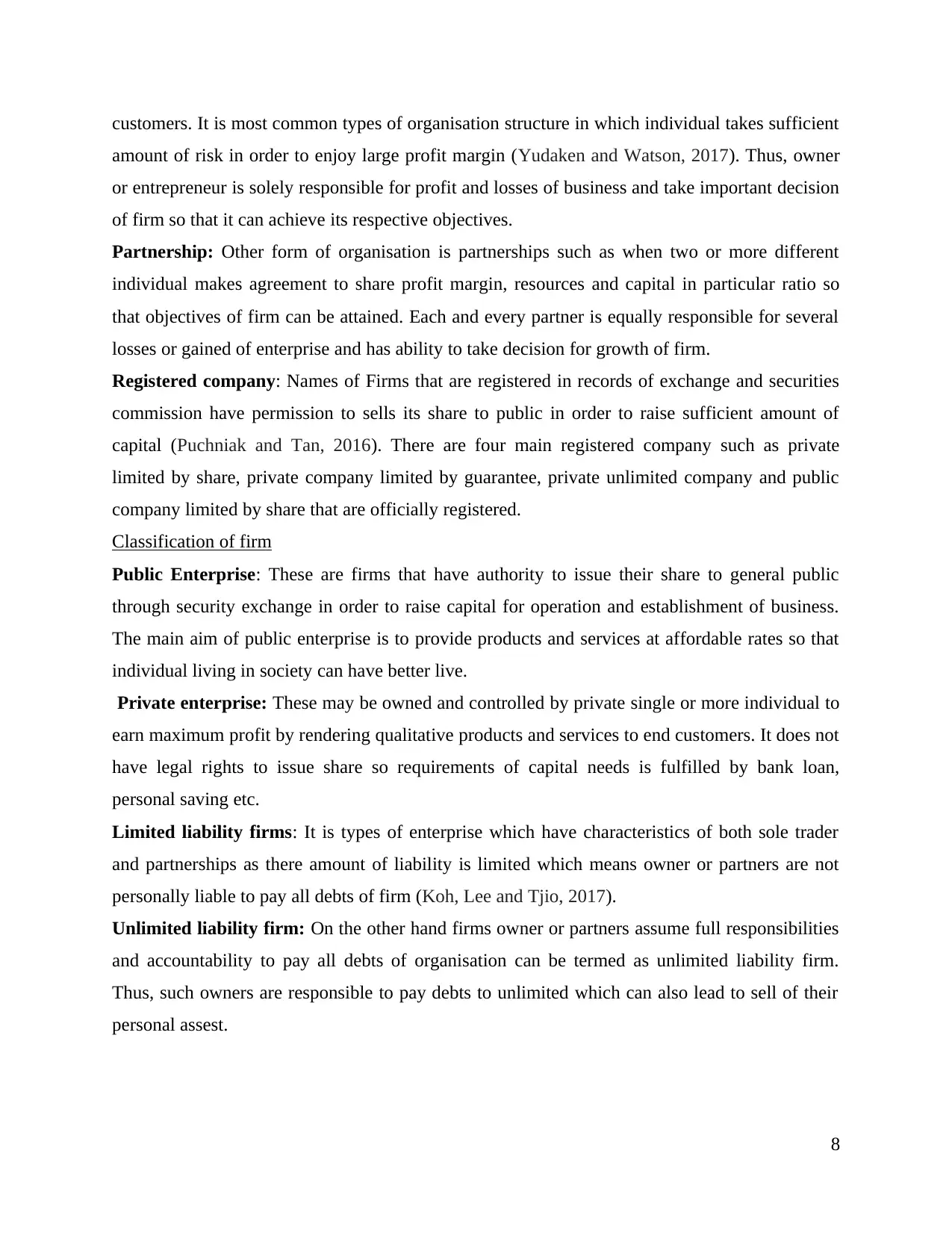
customers. It is most common types of organisation structure in which individual takes sufficient
amount of risk in order to enjoy large profit margin (Yudaken and Watson, 2017). Thus, owner
or entrepreneur is solely responsible for profit and losses of business and take important decision
of firm so that it can achieve its respective objectives.
Partnership: Other form of organisation is partnerships such as when two or more different
individual makes agreement to share profit margin, resources and capital in particular ratio so
that objectives of firm can be attained. Each and every partner is equally responsible for several
losses or gained of enterprise and has ability to take decision for growth of firm.
Registered company: Names of Firms that are registered in records of exchange and securities
commission have permission to sells its share to public in order to raise sufficient amount of
capital (Puchniak and Tan, 2016). There are four main registered company such as private
limited by share, private company limited by guarantee, private unlimited company and public
company limited by share that are officially registered.
Classification of firm
Public Enterprise: These are firms that have authority to issue their share to general public
through security exchange in order to raise capital for operation and establishment of business.
The main aim of public enterprise is to provide products and services at affordable rates so that
individual living in society can have better live.
Private enterprise: These may be owned and controlled by private single or more individual to
earn maximum profit by rendering qualitative products and services to end customers. It does not
have legal rights to issue share so requirements of capital needs is fulfilled by bank loan,
personal saving etc.
Limited liability firms: It is types of enterprise which have characteristics of both sole trader
and partnerships as there amount of liability is limited which means owner or partners are not
personally liable to pay all debts of firm (Koh, Lee and Tjio, 2017).
Unlimited liability firm: On the other hand firms owner or partners assume full responsibilities
and accountability to pay all debts of organisation can be termed as unlimited liability firm.
Thus, such owners are responsible to pay debts to unlimited which can also lead to sell of their
personal assest.
8
amount of risk in order to enjoy large profit margin (Yudaken and Watson, 2017). Thus, owner
or entrepreneur is solely responsible for profit and losses of business and take important decision
of firm so that it can achieve its respective objectives.
Partnership: Other form of organisation is partnerships such as when two or more different
individual makes agreement to share profit margin, resources and capital in particular ratio so
that objectives of firm can be attained. Each and every partner is equally responsible for several
losses or gained of enterprise and has ability to take decision for growth of firm.
Registered company: Names of Firms that are registered in records of exchange and securities
commission have permission to sells its share to public in order to raise sufficient amount of
capital (Puchniak and Tan, 2016). There are four main registered company such as private
limited by share, private company limited by guarantee, private unlimited company and public
company limited by share that are officially registered.
Classification of firm
Public Enterprise: These are firms that have authority to issue their share to general public
through security exchange in order to raise capital for operation and establishment of business.
The main aim of public enterprise is to provide products and services at affordable rates so that
individual living in society can have better live.
Private enterprise: These may be owned and controlled by private single or more individual to
earn maximum profit by rendering qualitative products and services to end customers. It does not
have legal rights to issue share so requirements of capital needs is fulfilled by bank loan,
personal saving etc.
Limited liability firms: It is types of enterprise which have characteristics of both sole trader
and partnerships as there amount of liability is limited which means owner or partners are not
personally liable to pay all debts of firm (Koh, Lee and Tjio, 2017).
Unlimited liability firm: On the other hand firms owner or partners assume full responsibilities
and accountability to pay all debts of organisation can be termed as unlimited liability firm.
Thus, such owners are responsible to pay debts to unlimited which can also lead to sell of their
personal assest.
8
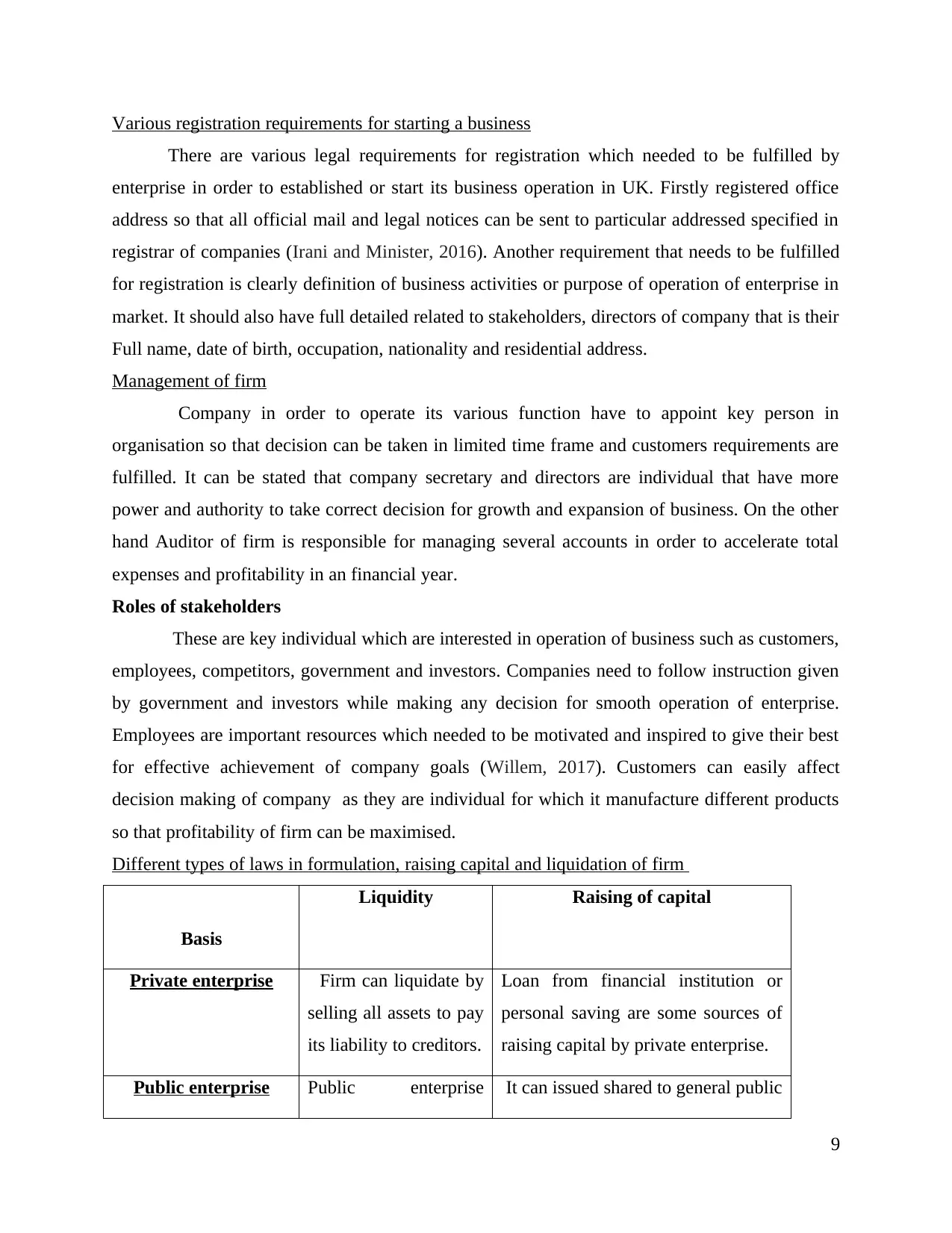
Various registration requirements for starting a business
There are various legal requirements for registration which needed to be fulfilled by
enterprise in order to established or start its business operation in UK. Firstly registered office
address so that all official mail and legal notices can be sent to particular addressed specified in
registrar of companies (Irani and Minister, 2016). Another requirement that needs to be fulfilled
for registration is clearly definition of business activities or purpose of operation of enterprise in
market. It should also have full detailed related to stakeholders, directors of company that is their
Full name, date of birth, occupation, nationality and residential address.
Management of firm
Company in order to operate its various function have to appoint key person in
organisation so that decision can be taken in limited time frame and customers requirements are
fulfilled. It can be stated that company secretary and directors are individual that have more
power and authority to take correct decision for growth and expansion of business. On the other
hand Auditor of firm is responsible for managing several accounts in order to accelerate total
expenses and profitability in an financial year.
Roles of stakeholders
These are key individual which are interested in operation of business such as customers,
employees, competitors, government and investors. Companies need to follow instruction given
by government and investors while making any decision for smooth operation of enterprise.
Employees are important resources which needed to be motivated and inspired to give their best
for effective achievement of company goals (Willem, 2017). Customers can easily affect
decision making of company as they are individual for which it manufacture different products
so that profitability of firm can be maximised.
Different types of laws in formulation, raising capital and liquidation of firm
Basis
Liquidity Raising of capital
Private enterprise Firm can liquidate by
selling all assets to pay
its liability to creditors.
Loan from financial institution or
personal saving are some sources of
raising capital by private enterprise.
Public enterprise Public enterprise It can issued shared to general public
9
There are various legal requirements for registration which needed to be fulfilled by
enterprise in order to established or start its business operation in UK. Firstly registered office
address so that all official mail and legal notices can be sent to particular addressed specified in
registrar of companies (Irani and Minister, 2016). Another requirement that needs to be fulfilled
for registration is clearly definition of business activities or purpose of operation of enterprise in
market. It should also have full detailed related to stakeholders, directors of company that is their
Full name, date of birth, occupation, nationality and residential address.
Management of firm
Company in order to operate its various function have to appoint key person in
organisation so that decision can be taken in limited time frame and customers requirements are
fulfilled. It can be stated that company secretary and directors are individual that have more
power and authority to take correct decision for growth and expansion of business. On the other
hand Auditor of firm is responsible for managing several accounts in order to accelerate total
expenses and profitability in an financial year.
Roles of stakeholders
These are key individual which are interested in operation of business such as customers,
employees, competitors, government and investors. Companies need to follow instruction given
by government and investors while making any decision for smooth operation of enterprise.
Employees are important resources which needed to be motivated and inspired to give their best
for effective achievement of company goals (Willem, 2017). Customers can easily affect
decision making of company as they are individual for which it manufacture different products
so that profitability of firm can be maximised.
Different types of laws in formulation, raising capital and liquidation of firm
Basis
Liquidity Raising of capital
Private enterprise Firm can liquidate by
selling all assets to pay
its liability to creditors.
Loan from financial institution or
personal saving are some sources of
raising capital by private enterprise.
Public enterprise Public enterprise It can issued shared to general public
9
⊘ This is a preview!⊘
Do you want full access?
Subscribe today to unlock all pages.

Trusted by 1+ million students worldwide
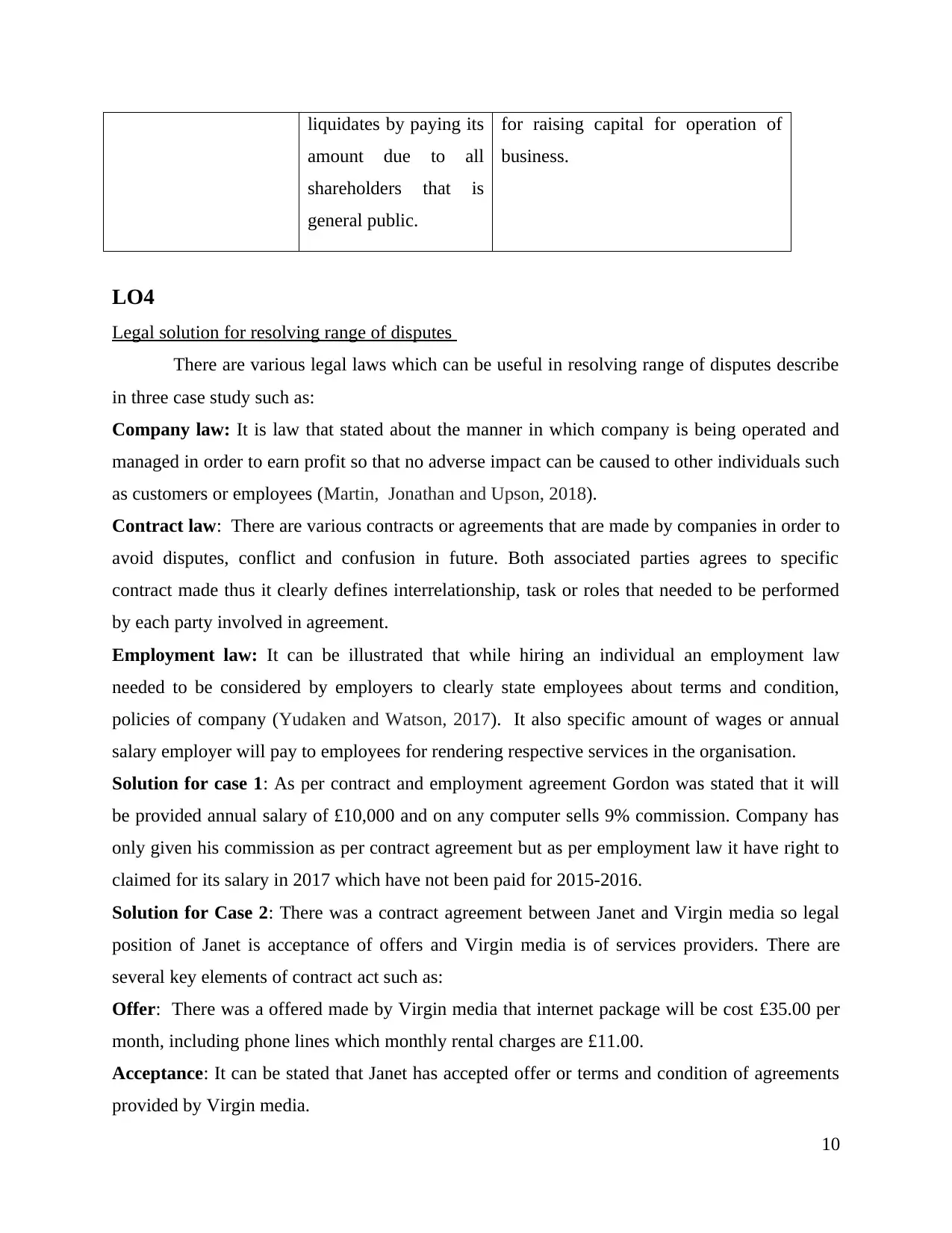
liquidates by paying its
amount due to all
shareholders that is
general public.
for raising capital for operation of
business.
LO4
Legal solution for resolving range of disputes
There are various legal laws which can be useful in resolving range of disputes describe
in three case study such as:
Company law: It is law that stated about the manner in which company is being operated and
managed in order to earn profit so that no adverse impact can be caused to other individuals such
as customers or employees (Martin, Jonathan and Upson, 2018).
Contract law: There are various contracts or agreements that are made by companies in order to
avoid disputes, conflict and confusion in future. Both associated parties agrees to specific
contract made thus it clearly defines interrelationship, task or roles that needed to be performed
by each party involved in agreement.
Employment law: It can be illustrated that while hiring an individual an employment law
needed to be considered by employers to clearly state employees about terms and condition,
policies of company (Yudaken and Watson, 2017). It also specific amount of wages or annual
salary employer will pay to employees for rendering respective services in the organisation.
Solution for case 1: As per contract and employment agreement Gordon was stated that it will
be provided annual salary of £10,000 and on any computer sells 9% commission. Company has
only given his commission as per contract agreement but as per employment law it have right to
claimed for its salary in 2017 which have not been paid for 2015-2016.
Solution for Case 2: There was a contract agreement between Janet and Virgin media so legal
position of Janet is acceptance of offers and Virgin media is of services providers. There are
several key elements of contract act such as:
Offer: There was a offered made by Virgin media that internet package will be cost £35.00 per
month, including phone lines which monthly rental charges are £11.00.
Acceptance: It can be stated that Janet has accepted offer or terms and condition of agreements
provided by Virgin media.
10
amount due to all
shareholders that is
general public.
for raising capital for operation of
business.
LO4
Legal solution for resolving range of disputes
There are various legal laws which can be useful in resolving range of disputes describe
in three case study such as:
Company law: It is law that stated about the manner in which company is being operated and
managed in order to earn profit so that no adverse impact can be caused to other individuals such
as customers or employees (Martin, Jonathan and Upson, 2018).
Contract law: There are various contracts or agreements that are made by companies in order to
avoid disputes, conflict and confusion in future. Both associated parties agrees to specific
contract made thus it clearly defines interrelationship, task or roles that needed to be performed
by each party involved in agreement.
Employment law: It can be illustrated that while hiring an individual an employment law
needed to be considered by employers to clearly state employees about terms and condition,
policies of company (Yudaken and Watson, 2017). It also specific amount of wages or annual
salary employer will pay to employees for rendering respective services in the organisation.
Solution for case 1: As per contract and employment agreement Gordon was stated that it will
be provided annual salary of £10,000 and on any computer sells 9% commission. Company has
only given his commission as per contract agreement but as per employment law it have right to
claimed for its salary in 2017 which have not been paid for 2015-2016.
Solution for Case 2: There was a contract agreement between Janet and Virgin media so legal
position of Janet is acceptance of offers and Virgin media is of services providers. There are
several key elements of contract act such as:
Offer: There was a offered made by Virgin media that internet package will be cost £35.00 per
month, including phone lines which monthly rental charges are £11.00.
Acceptance: It can be stated that Janet has accepted offer or terms and condition of agreements
provided by Virgin media.
10
Paraphrase This Document
Need a fresh take? Get an instant paraphrase of this document with our AI Paraphraser
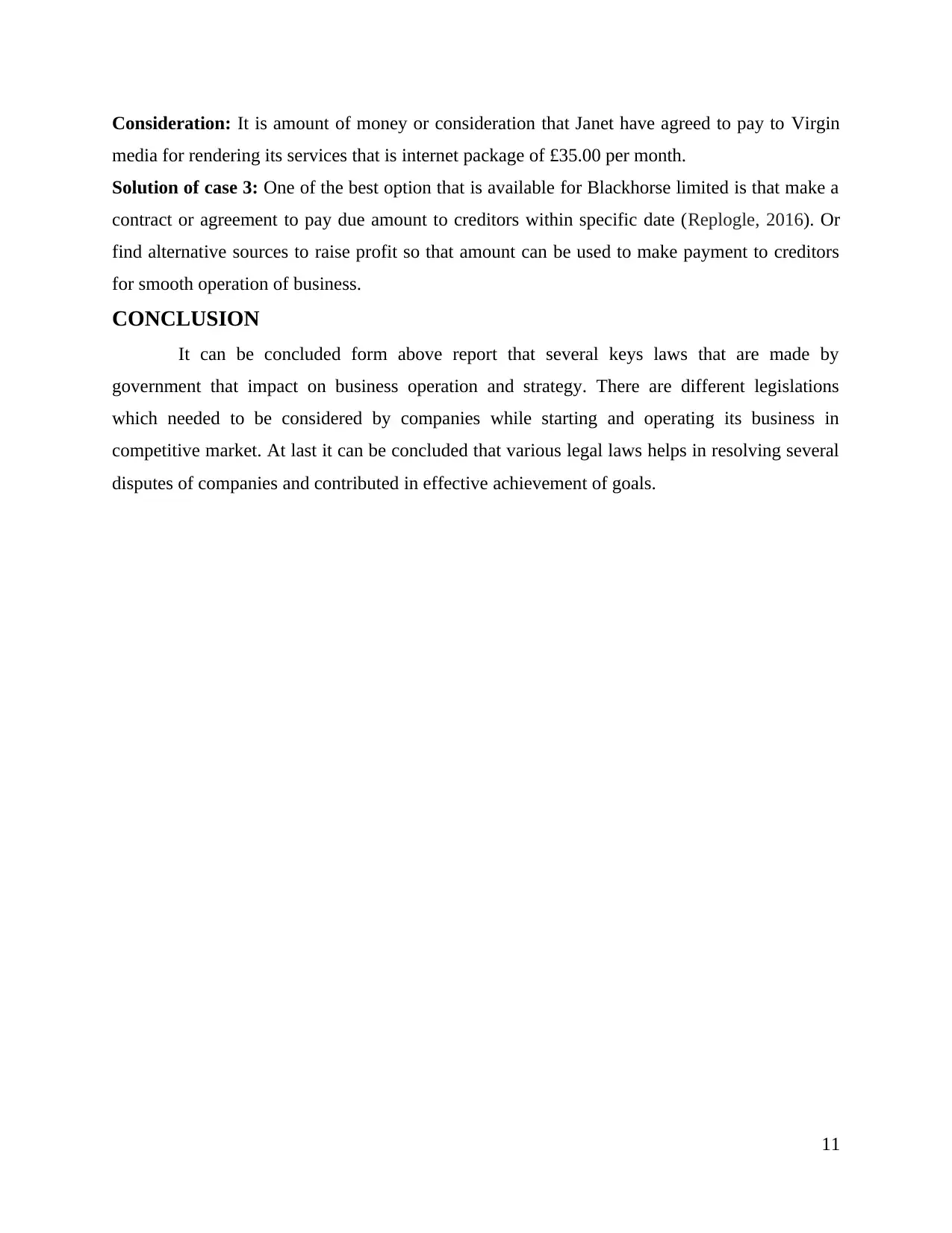
Consideration: It is amount of money or consideration that Janet have agreed to pay to Virgin
media for rendering its services that is internet package of £35.00 per month.
Solution of case 3: One of the best option that is available for Blackhorse limited is that make a
contract or agreement to pay due amount to creditors within specific date (Replogle, 2016). Or
find alternative sources to raise profit so that amount can be used to make payment to creditors
for smooth operation of business.
CONCLUSION
It can be concluded form above report that several keys laws that are made by
government that impact on business operation and strategy. There are different legislations
which needed to be considered by companies while starting and operating its business in
competitive market. At last it can be concluded that various legal laws helps in resolving several
disputes of companies and contributed in effective achievement of goals.
11
media for rendering its services that is internet package of £35.00 per month.
Solution of case 3: One of the best option that is available for Blackhorse limited is that make a
contract or agreement to pay due amount to creditors within specific date (Replogle, 2016). Or
find alternative sources to raise profit so that amount can be used to make payment to creditors
for smooth operation of business.
CONCLUSION
It can be concluded form above report that several keys laws that are made by
government that impact on business operation and strategy. There are different legislations
which needed to be considered by companies while starting and operating its business in
competitive market. At last it can be concluded that various legal laws helps in resolving several
disputes of companies and contributed in effective achievement of goals.
11
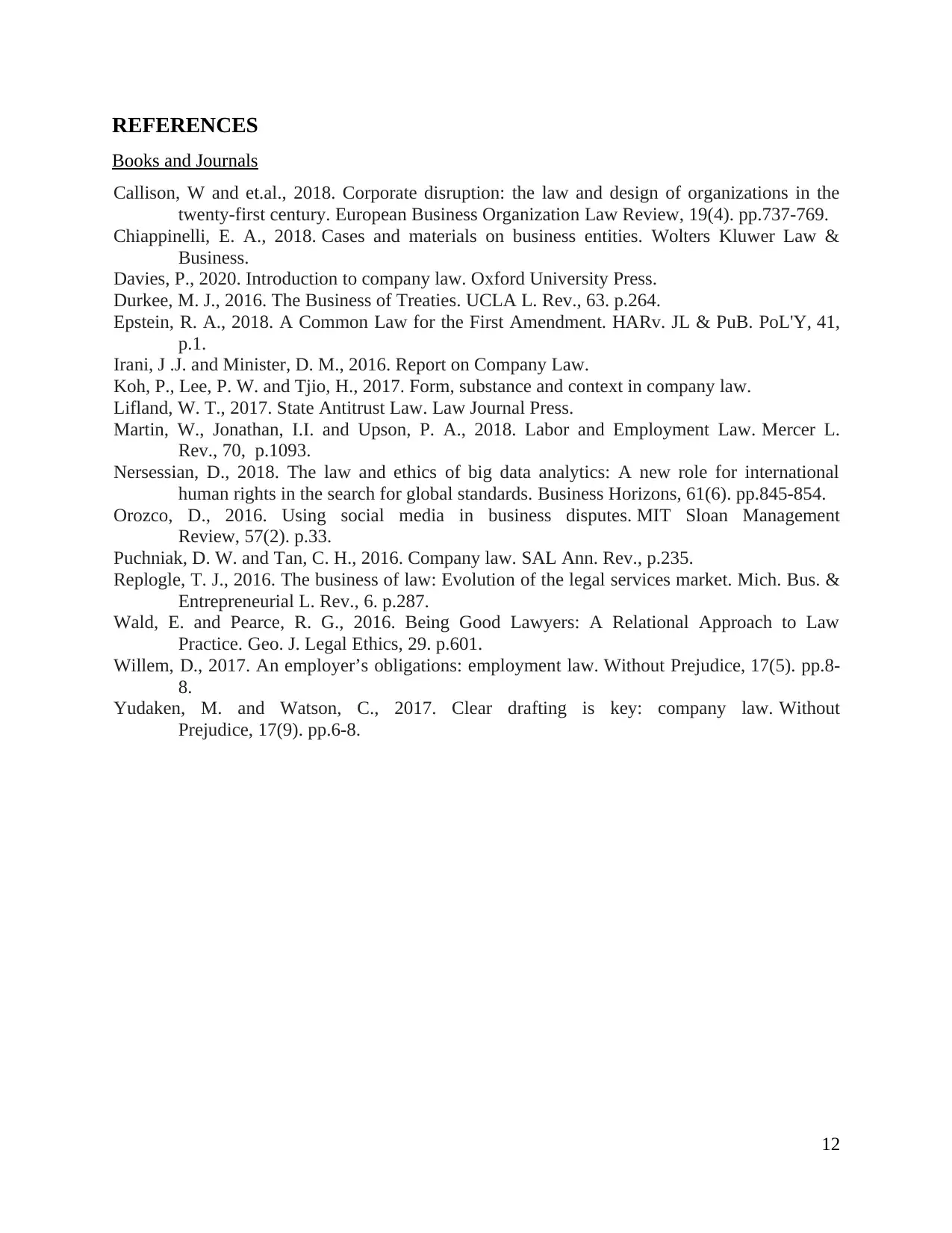
REFERENCES
Books and Journals
Callison, W and et.al., 2018. Corporate disruption: the law and design of organizations in the
twenty-first century. European Business Organization Law Review, 19(4). pp.737-769.
Chiappinelli, E. A., 2018. Cases and materials on business entities. Wolters Kluwer Law &
Business.
Davies, P., 2020. Introduction to company law. Oxford University Press.
Durkee, M. J., 2016. The Business of Treaties. UCLA L. Rev., 63. p.264.
Epstein, R. A., 2018. A Common Law for the First Amendment. HARv. JL & PuB. PoL'Y, 41,
p.1.
Irani, J .J. and Minister, D. M., 2016. Report on Company Law.
Koh, P., Lee, P. W. and Tjio, H., 2017. Form, substance and context in company law.
Lifland, W. T., 2017. State Antitrust Law. Law Journal Press.
Martin, W., Jonathan, I.I. and Upson, P. A., 2018. Labor and Employment Law. Mercer L.
Rev., 70, p.1093.
Nersessian, D., 2018. The law and ethics of big data analytics: A new role for international
human rights in the search for global standards. Business Horizons, 61(6). pp.845-854.
Orozco, D., 2016. Using social media in business disputes. MIT Sloan Management
Review, 57(2). p.33.
Puchniak, D. W. and Tan, C. H., 2016. Company law. SAL Ann. Rev., p.235.
Replogle, T. J., 2016. The business of law: Evolution of the legal services market. Mich. Bus. &
Entrepreneurial L. Rev., 6. p.287.
Wald, E. and Pearce, R. G., 2016. Being Good Lawyers: A Relational Approach to Law
Practice. Geo. J. Legal Ethics, 29. p.601.
Willem, D., 2017. An employer’s obligations: employment law. Without Prejudice, 17(5). pp.8-
8.
Yudaken, M. and Watson, C., 2017. Clear drafting is key: company law. Without
Prejudice, 17(9). pp.6-8.
12
Books and Journals
Callison, W and et.al., 2018. Corporate disruption: the law and design of organizations in the
twenty-first century. European Business Organization Law Review, 19(4). pp.737-769.
Chiappinelli, E. A., 2018. Cases and materials on business entities. Wolters Kluwer Law &
Business.
Davies, P., 2020. Introduction to company law. Oxford University Press.
Durkee, M. J., 2016. The Business of Treaties. UCLA L. Rev., 63. p.264.
Epstein, R. A., 2018. A Common Law for the First Amendment. HARv. JL & PuB. PoL'Y, 41,
p.1.
Irani, J .J. and Minister, D. M., 2016. Report on Company Law.
Koh, P., Lee, P. W. and Tjio, H., 2017. Form, substance and context in company law.
Lifland, W. T., 2017. State Antitrust Law. Law Journal Press.
Martin, W., Jonathan, I.I. and Upson, P. A., 2018. Labor and Employment Law. Mercer L.
Rev., 70, p.1093.
Nersessian, D., 2018. The law and ethics of big data analytics: A new role for international
human rights in the search for global standards. Business Horizons, 61(6). pp.845-854.
Orozco, D., 2016. Using social media in business disputes. MIT Sloan Management
Review, 57(2). p.33.
Puchniak, D. W. and Tan, C. H., 2016. Company law. SAL Ann. Rev., p.235.
Replogle, T. J., 2016. The business of law: Evolution of the legal services market. Mich. Bus. &
Entrepreneurial L. Rev., 6. p.287.
Wald, E. and Pearce, R. G., 2016. Being Good Lawyers: A Relational Approach to Law
Practice. Geo. J. Legal Ethics, 29. p.601.
Willem, D., 2017. An employer’s obligations: employment law. Without Prejudice, 17(5). pp.8-
8.
Yudaken, M. and Watson, C., 2017. Clear drafting is key: company law. Without
Prejudice, 17(9). pp.6-8.
12
⊘ This is a preview!⊘
Do you want full access?
Subscribe today to unlock all pages.

Trusted by 1+ million students worldwide
1 out of 12
Related Documents
Your All-in-One AI-Powered Toolkit for Academic Success.
+13062052269
info@desklib.com
Available 24*7 on WhatsApp / Email
![[object Object]](/_next/static/media/star-bottom.7253800d.svg)
Unlock your academic potential
Copyright © 2020–2026 A2Z Services. All Rights Reserved. Developed and managed by ZUCOL.





